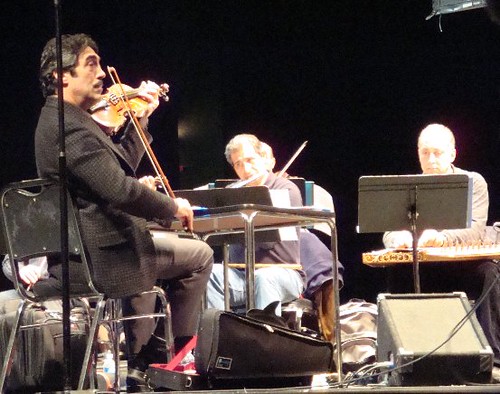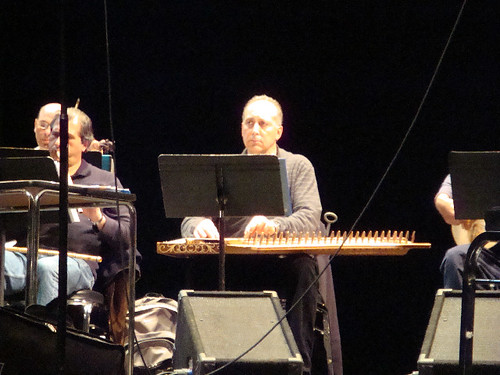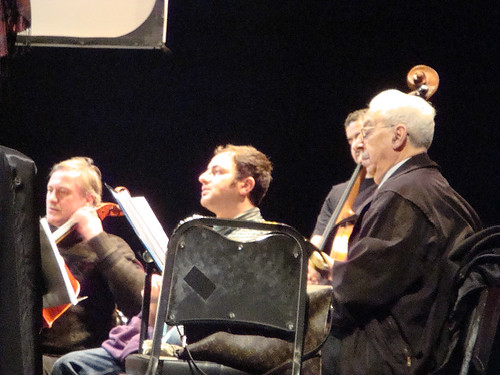
The last few days hanging out at Duke, I've been trying to learn Simon Shaheen's musicians by name, the instruments they play, and grasp just the tip of the iceberg of Arabic music. 16 musicians arrived Monday at Duke--from L.A., Boston, New York, Lebanon, Tunisia--and have been rehearsing like mad on a program of classical Arabic music from the "Golden Age." Apparently this refers to a golden age for cinema and movie music, in the Egyptian film industry of the 1930s-1960s. The concert tonight (Page Auditorium, 8 pm, Duke Performances) will also feature video projections of rare movie clips to go along with the music.

Jamal Senno plays the zither-like qanoun.
The four vocalists, 2 male and 2 female, all came from overseas. I've only heard Sonia M'Barek (gorgeous voice) and Ibrahim Azzam in rehearsal, and can't wait to hear Rima Khcheich and Khalil Abonula, who I'm told are also great. No doubt. This is an ensemble of first class cats, many of whom turned down other gigs to do the 20-day U.S. tour with Shaheen. Duke Performances shared this personnel list:
Orchestra (12 members)
Kamil Shajrawi - violin
William Shaheen - violin
Abeeb Refela - violin
Georges Lammam - violin
Simon Shaheen - violin / oud
Najib Shaheen - oud
Bassam Saba - nay/flute
Jamal Sinno (alt spelling: Senno)- qanun
Tomas Ulrich - cello
Walid Zairi - bass
Michel Merhej Baklouk - percussion
Dafer Tawil (alt spelling: Zafer) - percussion
Vocalist (4 featured)
Ibrahim Azzam - vocal
Sonia M'Barek - vocal
Khalil Abonula - vocal
Rima Khcheich - vocal
Welcome to the world of transliterated Arabic: I've found alt spellings for artist's names (what they tell me and what is on their Facebook page sometimes varies from the artist management's travel manifest), and for the names of instruments, and so I'm going to just print what people have told me and allow that there is some variation.

Tomas Ulrich, cello, Zafer Tawil and Michel Merhej Baklouk, percussion
As you can see from that list, many, if not most of these musicians are multi-instrumentalists. So for instance, Zafer Tawil is one of the two percussionists, but is also adept at oud, violin, etc. I'm not sure if I photographed Bassam Saba with a violin in rehearsal at one point, in addition to Western flute and Arabic reed flute(or nay/nye), but I wouldn't be surprised. (Saba is a member of Silk Road Project, and Shaheen's Quantara and Near Eastern Music Ensemble.) All three Shaheen brothers, Simon, Najib and William, play both oud and violin. (Najib is a master luthier, while William sidelines as an optometrist.) I've played a violin in my life and know that this is obviously not the same technique at all. [Although a local musician I talked to at the gig pointed out, both are fretless and have a neck and fingerboard of similar size.] I find it intriguing that this is a common prerequisite for these Arabic musicians, who must have a well-rounded approach to the music that would come from mastering very different techniques to achieve the same ends. While it's not completely rare in Latin, jazz or classical circles, it's certainly more typical for instrumentalists to specialize in one instrument, or in instruments with a similar technique (i.e. trumpet/flugelhorn/valve trombone, saxophones/flutes, etc.)
UPDATE - Concert Review, added 3/6:
"ASWAT (Voices): Celebrating the Golden Age of Arab Music" was a monumental concert event, 3 hours of music with intermission, and well worth being among the first to hear it last night in Duke University's Page Auditorium.
"You are going to hear the best voices in the Arab World," Simon Shaheen said, and he wasn't kidding. The first half of the program featured the exquisite Khalil Abonula and Rima Khcheich, performing individually and then as a duet. Part two followed a similar format, with Sonia M'Barek followed by Ibrahim Azzam, closing with a duet.
Before they played, a short segment of film clips introduced us to stars of the Egyptian film industry who first sang these tunes on screen and, via the magic of mass culture, popularized them throughout the Arab world. A montage of the images and voices of Egytian stars Um Kulthum and Mohammad Abdel Wahhab, the Lebanese diva Fairuz and Syrian movie star and composer Farid Al Atrash, among others, flashed onscreen above the musicians, and were referenced briefly throughout the evening as new singers took on their roles. [It occurred to me during the program that one could do something similar with the Mexican film industry.]
Farid Al Atrash with bellydancer Samia Gamal in 1950
The musicians wore black tie without the tie, but Simon proved very down-to-earth as he spoke with the audience to introduce the program. (That's the vibe I got from them throughout their visit; friendly and unpretentious, with a low-key sense of humor). It's not for nothing Shaheen is considered an ambassador for Arabic music; not only is he a multi-ensemble leader and performer, but since 1996 he has organized an annual workshop retreat in Arabic music at Mt. Holyoke College.
Program Notes:
Part 1
They opened with an instrumental arrangement of "Fakkaruni" (Remind Me) by Mohammed Abdel Wahhab. It seems not uncommon for an Arabic music audience, like a jazz audience, to applaud mid-way through a piece to acknowledge solos. Musicians will also express a word or gesture of appreciation for solos that are tasty or cooking; we witnessed both of these during this opening number.
Next, Khalid Abonula from Palestine sang a truly exquisite song called "Jannat" (Gardens), by Lebanese composer and singer Wadi' Al Safi to lyrics by Abdel Jalil Wihbeh. This was a slow piece with wrenchingly elaborate ornaments, and like all the singers, he was mighty and effortless. I can't interpret the words, yet I could really sense the storytelling energy behind his delivery. [Off the record: I ran into these guys at the grocery store a few nights earlier, and Khalid was stocking up on Kit Kats--could that be part of his regimen for maintaining his silky smooth voice, I wondered?]
Abonula followed that with an equal tour de force by the same songwriters, "Wayli Laou Yidrun," about a guy in love with a woman not approved of by his parents. Both of these opened with qanoun solos by Jamal Sinno, over a low drone in the violins. I don't know enough about the structure of this music to speak knowledgably about it, but I was trying to take notice. Mr. Abonula projected warmth and polish with a deep blue tie peeking out of a high-buttoned, long-cut jacket.
Lebanese singer Rima Khcheich ('Ka-shaysh') was introduced for the next two numbers. The petite Ms. Khcheich wore a simple all black emsemble of trousers, strapless top, and an airy, full-length wrap bordered in white or silver embroidery. She gestured emphatically, raising her upper arms near her head while singing, beginning with the long, intense 'Qasida' poem "Sakana I-Layl" (Calm Night), an Abdel Wahhab tune setting lyrics by Gibran Khalil Gibran.
Rima literally stole the show with an a capella interlude between that and her next number, "Il Wardi Gamil" (Lovely Flowers), an Um Kulthum hit in the 1947 film "Fatima." In the interlude, introduced by Simon's violin solo, Rima's high, ampflied solo voice, literally trembling at times, entranced everyone I talked to in the hall. It's worth noting that none of the singers read their parts from sheet music, and the intricate melodies and lyrics they have committed to memory is no doubt extensive.
Part one wrapped by bringing Khalil back out to sing with Rima an excerpt from a 1960s Lebanese musical about rural life, Sahrit Hubb (An Evening of Love), a TV sketch that originally starred Fairuz and Wadi' Al Safi.
Part 2
Again they opened with a sort of jam session [an Arab descarga, I thought], "Kahramana" by Farid Al Atrash [who looks a little like Tito Rodriquez in the film clips, in one of them wearing a tuxedo.] Solos in order, if I'm not mistaken, by: Jamal Sinno (qanoun = zither), Bassam Saba (nay = flute), Najib Shaheen (oud = lute), Kamil Shajrawi (violin). This tune is an instrumental dance number from a 1949 Egyptian film, "Afrita Hanim" (Jinni) starring Al Atrash and Samia Gamal.
Also of interest to me, as an aside, was how often the string players tuned up between numbers. With microtones in their scales and modes, I'm sure that pitch is an especially keen matter. I am not sure how the violins, cello and bass are tuned, i.e. if they vary from Western tuning, but it didn't sound like it as they were bowing their open fifths. However, that's just my guess. Also, I wondered how they play microtonal scales on the reed flute (nay/ney); I thought to look more closely and saw that Bassam had at least 6 nays on a table by his side. Are these keyed to different maqams, or what? Clearly I need to do more research.
The stately, emotive Sonia M'Barek came out next, looking like a queen in a pillar of aqua silk, to sing a really divine Arabic ode to Vienna. "Layalil 'Unsi Fi Vienna" (Merry Nights in Vienna) is in vals time, which Simon says is no stranger in Arab music. The tune comes from the 1944 film Gharam Wa Intiqam (Love and Revenge) starring Farid Al Atrash's sister, Asmahan.
Asmahan in one of the films that inspired ASWAT
Sonia then sang "Ana Fi Intidharak Malleit" (I Am Fed Up Waiting For You) which was another glorious highpoint of the evening. She emotes from deep within her body when she sings. Not to shortshrift the concert performance--you definitely got the feeling she gave her utmost to a live audience--but it's possible this tune was even more delicate and moving in the rehearsal, when the band and singers were without amplification. In any case, it moved listeners at the open rehearsal to spontaneous applause. M'Barek is Tunisian and has specialized in Tunisian and Andalucian music since she was a child.
"Ya Wardi Min Wishtirik" (The Flower Buyer) brought Palestinian singer Ibrahim Azzam to the stage next, in a bright yellow tie, and with a second oud in hand. They set him up troubadour style, standing at a pair of mics with one leg on a chair to support the oud. The song is an Abdel Wahhab tune, setting lyrics by Lebanese poet Bishara Al Khoury. It tells the story of a moody monologue by a young man, thinking about buying a flower for his beloved.
Next was "Ya 'Awathil Falfillu," another Farid tune from the 1950 film "Akhir Kithba" (Last Lie) that got the audience clapping. A brief oud solo from Najib was welcome, and the duelling ouds with Najib and Ibrahim was a real crowdpleaser.
The evening ended with a happy ending: "Ya Di n-Na'im" (Living in Happiness), from the 1938 film Yahyal Hubb (Love Wins) starring Layla Murad and Mohammed Abdel Wahhab. Sonia and Ibrahim sang this dialogue about reunited lovers.
A few sound problems got worked out in the first half, so the premiere should set them up well for their big coming out party in D.C. There was talk among the musicians of the program running long, so it could be that some numbers will get tightened up or cut during the tour. I don't know if the Arabic music scene is just super laidback about autographs or what, but the supporting musicians seemed very phlegmatic about signing CDs. They all referred me to Simon to do the honors. He did, with the graciousness he showed to everyone throughout his residency here. (And I even got Najib to throw his John Hancock on it in Arabic.) Thanks to ASWAT Orchestra for access to their practice sessions and a fantastic, extended play concert of rare music.
If you're in a touring city where tickets are still available, I definitely recommended you catch this, it's an epic work on the visionary scale of Wynton Marsalis' Congo Square with Yacub Addy, bringing together musicians it will be hard to catch together anywhere else. As someone new to traditional Arabic music, I found it accessible and entrancing; there can't be a better way to hear this music for the first time than live, by some of the best practitioners in the world. Fans of Arab music won't have to be told twice; ASWAT is a cultural experience not to be missed.
Links:
Simon Shaheen on WUNC's The State of Things
A story I wrote for Duke Today about Shaheen's reception on campus
Syrian Clarinettist Kinan Azmeh on Weekend Edition
NPR's Sampling of the Arabesque Festival in D.C.




No comments:
Post a Comment